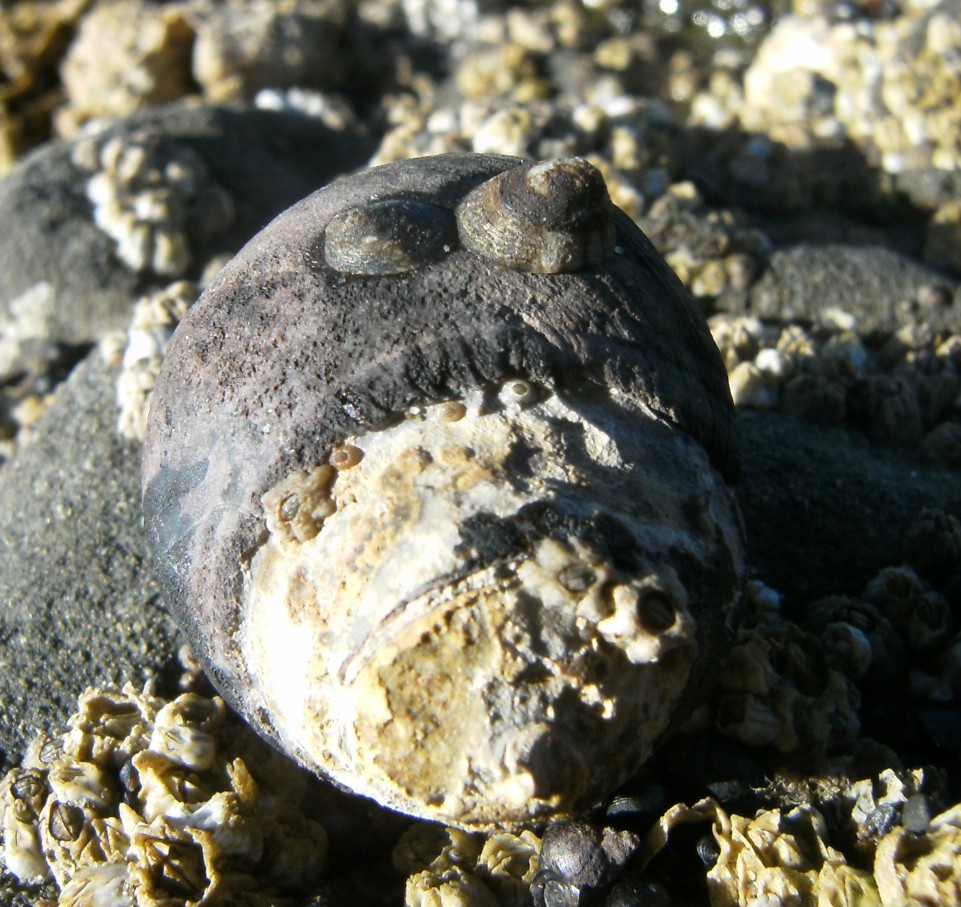Lottia asmi (Middendorf, 1847)Common name(s): Black limpet |
|
| Synonyms: Acmaea asmi, Collisella asmi |  |
|
Phylum Mollusca
Class Gastropoda
Subclass Prosobranchia
Order Patellograstropoda
Suborder Nacellina
Family Lottidae
|
|
| Lottia asmi (on right), about 0.5 cm long, on a Chlorostoma funebralis snail shell. At San Simeon Beach, CA | |
| (Photo by: Dave Cowles, August 2010) | |
Description: This limpet has a moderately high apex about 1/3 from the front of the shell. The outside is grayish or brownish black without major ribs, often partly eroded, while the inside is black. Sometimes a light band is found inside the shell running around the aperture near the margin. The external shell is mostly smooth but fine radial ridges can sometimes be seen at the margin. Usually found living on the black turban snail Chlorostoma funebralis but sometimes on Mytilus californianus. Length up to about 1cm and height to 8 mm.
How to Distinguish from Similar Species: Most other dark, smooth limpets grow larger and do not usually live on black turban snails (at least as adults--some juveniles of other species may be found on turban snails but their shells are generally flatter--see the photo above).
Geographical Range: Southern Alaska to Islas de Revillagigedo, northern Mexico
Depth Range: Mostly intertidal
Habitat: Usually found on the black turban snail Chlorostoma funebralis
Biology/Natural History: As with other limpets, this species grazes on microalgae on the substrate (in this case, on the turban snail's shell). The species may move from one host to another, probably when the hosts are aggregated together at low tide. It avoids shells that are not occupied, and seems to prefer shells occupied by snails to those occupied by hermit crabs. Washing shells with alcohol or distilled water reduce the limpet's attraction to them.
Spawning is in spring and fall. Eggs and sperm are released into the water. Larvae have a planktonic phase and develop a coiled shell before settling and developing a cap-shaped shell.
In California this limpet sometimes is found on the shell of
the speckled
turban, Tegula
gallinea.
| Return to: | |||
| Main Page | Alphabetic Index | Systematic Index | Glossary |
References:
Dichotomous Keys:Carlton, 2007
Flora and Fairbanks, 1966 (as Collisella asmi)
Kozloff, 1987, 1996
General References:
Brandon
and Rokop, 1985 (as Collisella
asmi)
Hinton,
1987 (as Collisella
asmi)
Johnson
and Snook, 1955 (as Acmaea asmi)
Kozloff,
1993 (as Collisella
asmi)
Lamb
and Hanby, 2005
Morris
et al., 1980 (as Collisella
asmi)
Niesen,
1997
Rice,
1973
Ricketts
et al., 1985 (as Collisella
asmi)
Scientific Articles:
Alleman, L. L., 1968. Factors affecting the attraction
of Acmaea
asmi to Tegula
funebralis.
Veliger 11 (supplement): pp 61-63
Brewer, B.A., 1975. Epizoic limpets on the black turban snail, Tegula funebralis (A. Adams, 1855). Veliger 17: pp 307-310
Eikenberry, A.B. Jr. and D. E. Wickizer, 1964. Studies on the commensal limpet Acmaea asmi in relation to its host, Tegula funebralis. Veliger 6 (supplement): pp 66-70
Web sites:
General Notes and Observations: Locations, abundances, unusual behaviors:
Authors and Editors of Page:
Dave Cowles (2010): Created original page
CSS coding for page developed by Jonathan Cowles (2007)
Rosario Invertebrates web site provided courtesy of Walla Walla University